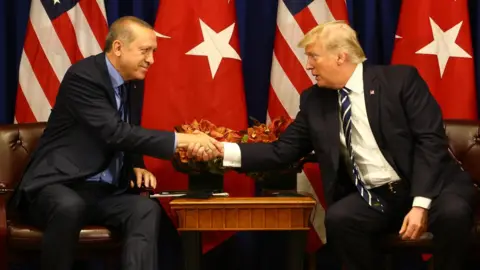Turkey elections: How powerful will the next Turkish president be?
There's no question that the biggest issue for most voters in the Turkish elections was the state of the country's economy.
But the most immediate impact of President Recep Tayyip Erdogan's victory is that he will now preside over a brand new presidential system of government.
It was approved in a controversial referendum last year, and it's a system Mr Erdogan seems to have designed with one man in mind.
Himself.
The office of prime minister has been abolished and executive power transferred to the president, who will become both head of state and head of government.
He will directly appoint ministers, many judges and bureaucrats, and one or more vice-presidents. There will be no elected vice-president.
The national budget, previously set by parliament, will now be drafted by the president. If parliament refuses to adopt it, the previous year's budget will remain in force.
Parliament could impeach Mr Erdogan, if there is a two-thirds majority in favour. But the final judgement would be made by the constitutional court, most of whose members are appointed by the president himself.
The Venice Commission, which provides legal advice to the Council of Europe (of which Turkey is a member), has set out its concerns about many of these reforms in detail.
 Getty Images
Getty ImagesIn a report on Turkey's constitutional changes, written before the referendum, it concluded that "they lead to an excessive concentration of executive power in the hands of the president and the weakening of parliamentary control of that power".
Mr Erdogan's ruling Justice and Development Party (AKP), on the other hand, insists that many of the new measures are progressive.
Military courts are abolished, and in principle laws will prevail over presidential decrees. It argues that the new system will be a better one, providing stability in a time of turmoil.
"The president is elected by the people and he's directly responsible to the ballot box," said Zeynep Jane Kandur, a board member of the AKP's Istanbul branch.
"This is not a weakening of democracy; it is an increase in democracy because the president is directly elected by the people."
The government says it compares with other presidential systems in the West. But does that stand up to scrutiny?
United States
In the US, the separation of powers is clearly established - executive, legislative and judicial.
If Congress rejects a budget, the federal government shuts down until compromise is found.
The president nominates judges and cabinet members, but Congress has to approve them.
France
In France, a prime minister is still head of government, and is sometimes from a different party than the president.
The French president appoints three out of nine judges to the country's top court, while in Turkey it will be 12 out of 15.
There is also a broader point that is worth emphasising: you can't assess a constitution without taking account of the politics that surround it.
And in Turkey, the opposition is worried about Mr Erdogan holding all the reins of power. A better comparison, they argue, is Vladimir Putin's Russia.
"The new regime that takes effect from today is a major danger for Turkey", said the defeated presidential candidate Muharrem Ince of the opposition Republican People's Party (CHP).
"We have now fully adopted a regime of one-man rule."
 Getty Images
Getty ImagesThe new constitution mandates that presidential and parliamentary elections should be held on the same day every five years, and that a president can serve a maximum of two terms. (There is no provision for midterm elections such as those in the United States.)
There would be also be a possibility of a president running for a third term, if the second one was truncated by the calling of early elections.
And it is worth remembering that Mr Erdogan has already been in power for 15 years, first as prime minister and then as president.
Now this election has set him well on the way towards achieving a long-held ambition: to be president in 2023, on the 100th anniversary of the founding of the Turkish republic.
He still has millions of fervent supporters across the country, and he argues that the new presidential system will give Turkey a strong leader able to deal more effectively with the many challenges it faces.
"It's what people want," said Ms Kandur, "because it will give the country better government."
Opposition leaders disagree and they had campaigned during the election on a promise to overturn most of the constitutional changes. The Venice Commission - while it can't force Turkey to change anything - shares many of their concerns.
It warns of "a presidential regime which lacks the necessary checks and balances required to safeguard against becoming an authoritarian one".



